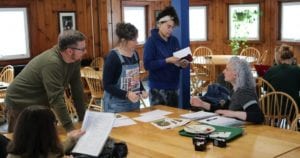 I just returned from the University of Targu Mures in Transylvania where I had my play, Born in East Berlin, translated into both Romanian and Hungarian. The funny thing is that they could just as well have been doing Cymbeline and I wouldn’t have known the difference if it weren’t for the fact that every so often I’d hear the name of one of my play’s characters.
I just returned from the University of Targu Mures in Transylvania where I had my play, Born in East Berlin, translated into both Romanian and Hungarian. The funny thing is that they could just as well have been doing Cymbeline and I wouldn’t have known the difference if it weren’t for the fact that every so often I’d hear the name of one of my play’s characters.
I place laughs in a play to carefully track the play’s relationship with the audience. If a laugh fails to land then there may be several reasons why. It may be the acting or the directing, but usually it’s the writing. It has little to do with the laugh itself but with those things surrounding the laugh – plot, characters, obstacles, etc. In other words, it’s not whether the joke is funny or not but whether the audience has been paying attention to the play.
When listening to a play in a foreign language it’s difficult to measure a play’s progress by whether the jokes land or not. The joke may just not be funny in a different language (the context may just be off). And then there are the unexpected laughs. These laughs happen in the oddest places. A line placed innocently enough and with no comic purpose may get a huge laugh. In short, to judge a play’s success in a language that is not your own you need to come up with a different way of listening to the work.
You can no longer track the laughs; instead, you must listen to the scene as a whole – a much healthier way of working. Depending on language and pacing a scene may go a minute or two longer or vice versa but not much more than that. What you then start to listen for is scene length. Does the length of the scene match up with how much is being revealed in the scene (I speak here in terms of character and plot).
Conclusion? There’s always room for cutting. By pulling back and seeing the whole of the scene, one soon realizes that there is a bit of overwriting going on. Laughs can trick you into believing the opposite, but listening to a play in a language that is not your own will not. This whole thing calls to mind the one piece of advice my graduate school professor, Romulus Linney, would drill into us each time we met: Cut when you can and stick to the point.







